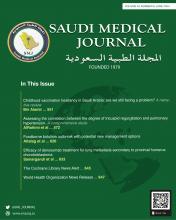APRIL 22, 2024 - Long-term daily use of aspirin can help to prevent the development and progression of colorectal cancer, but the mechanisms involved have been unclear. New research has revealed that aspirin may exert these protective effects by boosting certain aspects of the body’s immune response against cancer cells. The findings are published by Wiley online in CANCER, a peer-reviewed journal of the American Cancer Society.
To investigate the effects of aspirin (a nonsteroidal anti-inflammatory drug) on colorectal cancer, investigators in Italy obtained tissue samples from 238 patients who underwent surgery for colorectal cancer in 2015–2019, 12% of whom were aspirin users. Patients were enrolled in the METACCRE section of the IMMUNOlogical microenvironment in the REctal Adenocarcinoma Treatment (IMMUNOREACT 8) multicenter observational study. The study was funded by the Associazione Italiana per la Ricerca sul Cancro (AIRC) and was mainly carried out at the University Hospital of Padova.
Compared with tissue samples from patients who did not use aspirin, samples from aspirin users showed less cancer spread to the lymph nodes and higher infiltration of immune cells into tumors. In analyses of colorectal cancer cells in the lab, exposing the cells to aspirin caused increased expression of a protein called CD80 on certain immune cells, which enhanced the capacity of the cells to alert other immune cells of the presence of tumor-associated proteins. Supporting this finding, the researchers found that in patients with rectal cancer, aspirin users had higher CD80 expression in healthy rectal tissue, suggesting a pro-immune surveillance effect of aspirin.
“Our study shows a complementary mechanism of cancer prevention or therapy with aspirin besides its classical drug mechanism involving inhibition of inflammation,” said principal investigator Marco Scarpa MD, PhD, of the University of Padova. “Aspirin is absorbed in the colon by passive diffusion to a significant degree. Its absorption is linear and depends on concentration along the bowel, and in the rectum, the concentration of orally administered aspirin can be much lower than in the rest of the colon. Thus, if we want to take advantage of its effects against colorectal cancer, we should think of how to guarantee that aspirin reaches the colorectal tract in adequate doses to be effective.”
Full Citation: “IMMUNOREACT 7: Regular aspirin use is associated with immune surveillance activation in colorectal cancer.” Ottavia De Simoni, Melania Scarpa, Ignazio Castagliuolo, Astghik Stepanyan, Imerio Angriman, Andromachi Kotsafti, Camilla Nacci, Federico Scognamiglio, Silvia Negro, Antonella D’Angelo, Valentina Chiminazzo, Gianluca Businello, Cesare Ruffolo, Roberta Salmaso, Boris Franzato, Mario Gruppo, Pierluigi Pilati, Antonio Scapinello, Anna Pozza, Tommaso Stecca, Marco Massani, Ivana Cataldo, Stefano Brignola, Angelo Paolo Dei Tos, Carlotta Ceccon, Vincenza Guzzardo, Chiara Vignotto, Luca Facci, Isacco Maretto, Marco Agostini, Francesco Marchegiani, Giulia Becherucci, Maurizio Zizzo, Giovanni Bordignon, Roberto Merenda, Giovanni Pirozzolo, Alfonso Recordare, Giulia Pozza, Mario Godina, Isabella Mondi, Daunia Verdi, Corrado Da Lio, Licia Laurino, Luca Saadeh, Giorgio Rivella, Silvio Guerriero, Chiara Romiti, Giuseppe Portale, Chiara Cipollari, Ylenia Camilla Spolverato, Giulia Noaro, Roberto Cola, Salvatore Candioli, Laura Gavagna, Fabio Ricagna, Monica Ortenzi, Mario Guerrieri, Giovanni Tagliente, Monica Tomassi, Umberto Tedeschi, Beatrice Salmaso, Gianluca Buzzi, Dario Parini, Daniela Prando, Matteo Zuin, Francesca Bergamo, Vittorina Zagonel, Andrea Porzionato, Francesco Cavallin, Barbara Di Camillo, Loretta Di Cristoforo, Quoc Riccardo Bao, Salvatore Pucciarelli, Romeo Bardini, Gaya Spolverato, Matteo Fassan, and Marco Scarpa, on behalf of the IMMUNOREACT Study Group. CANCER; Published Online: April 22, 2024 (DOI: 10.1002/cncr.35297).
URL Upon Publication: http://doi.wiley.com/10.1002/cncr.35297
Copyright © 2021 The Cochrane Collaboration. Published by John Wiley & Sons, Ltd., reproduced with permission.
- Copyright: © Saudi Medical Journal
This is an Open Access journal and articles published are distributed under the terms of the Creative Commons Attribution-NonCommercial License (CC BY-NC). Readers may copy, distribute, and display the work for non-commercial purposes with the proper citation of the original work.






